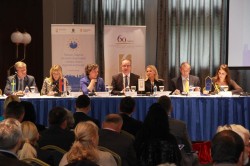Conference on establishment of municipal EU offices/officers held

The Standing Conference for Towns and Municipalities in cooperation with the Ministry of State Administration and Local Government and Serbian Chief Negotiator for Negotiations on Accession to the EU, organized in Belgrade on September 25th a conference named ‘Establishment of institutional mechanisms for EU-affairs in the municipalities’. More than 100 participants listened to – and discussed - SCTM’s different proposals on how to organize and coordinate EU-work in Serbian municipalities.
Representatives from the central government – Minister for State Administration and Local Government Ms. Kori Udovički and Minister without Portfolio responsible for EU integration Ms. Jadranka Joksimović - emphasized the importance of preparations for EU also at the local level. Most EU-directives are to be implemented at the local level, and experiences from Sweden and other countries tell us that around 60% of municipalities’ daily activities are influenced by EU.
Serbia’s chief negotiator to EU, Ms. Tanja Miščević, said that it’s simply necessary to involve the local level when approaching EU. Soon, she said, we will together with SCTM organize an operational meeting with local representatives on how to organize the EU affairs in daily work of municipalities.
The EU-minister proposed a “collective approach” when preparing for an EU membership and characterized SCTM’s contribution so far as “remarkable”. But the different municipalities will have to be yet more active in the near future. Both ministers, and also the EU ambassador to Serbia Mr. Michael Davenport, pointed at the importance of the ongoing project cooperation with Sweden and SALAR.
Sweden’s ambassador in Belgrade, Mr. Christer Asp, said that Sweden is in fact the second biggest bilateral donor to Serbia and that the support to SCTM projects will probably continue in years to come.
The conference ended with a constructive discussion about the different models for organizing the EU-work at the local level.
<< Back



